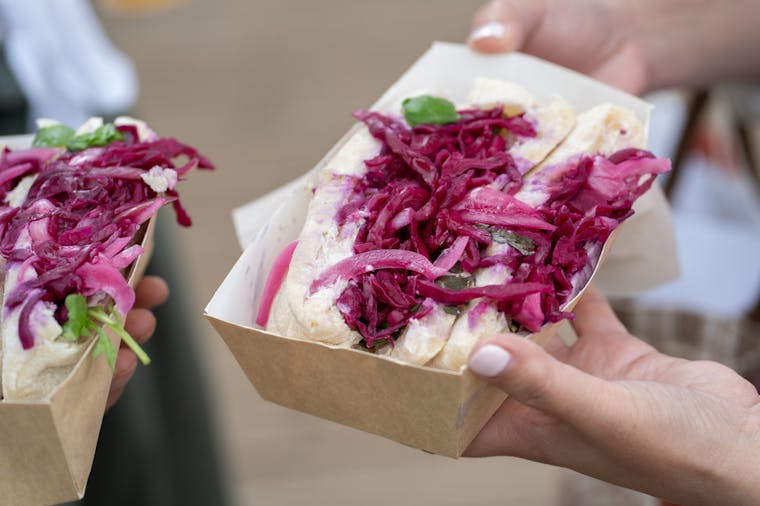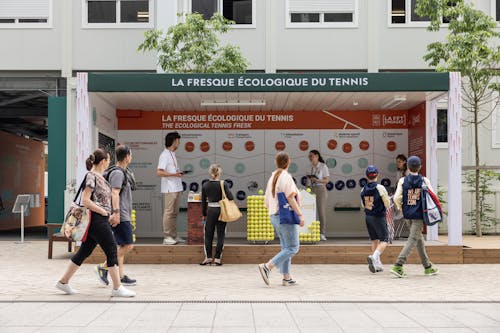
High-quality ingredients, fighting food waste, keeping rubbish to a minimum… We are shining the spotlight on the commitments made by Roland-Garros with regard to the food served at this year’s tournament.
The Roland-Garros tournament has been committed to a responsible and ecological approach for several years now. For the 2025 tournament, the Parisian Grand Slam is continuing its actions to help preserve the environment and raise public awareness.

We shine the spotlight on the actions and programmes rolled out to help reduce the tournament’s environmental impact in 2025.
More sustainable mobility
Everyone coming to Roland-Garros has a part to play in terms of transport, whether they are spectators, players or staff. In addition to promoting public transport and car-pooling, two free, free and guarded bicycle parking areas are being set up to encourage spectators to travel to the stadium by bike or scooter. Users can leave their helmet and battery packs in the left luggage areas, and those who arrive early get to use a “fastline” to enter the stadium for the whole duration of the tournament. For more peace of mind, spectators have the option of pre-booking a parking space online. A free checking service will also be offered.
With regard to the official fleet of vehicles made available to the FFT to transport the players, officials and VIPs, Renault is providing 87% hybrid or electric vehicles this year.

Responsible food
In partnership with the GoodPlanet Foundation, the FFT has been working since 2016 with all the tournament’s restaurants and caterers to develop a sustainable food plan, with the aim of offering products that are more responsible – certified products, produced locally and in season – which is essential in the fight against the climate crisis. For the second year in a row, a green score is displayed on the products on sale in the public catering areas and 60% of the food available in the stadium is vegetarian.
Roland-Garros is continuing to tackle food waste by working with the charity Le Chaînon Manquant. This initiative, implemented in 2014, collected the equivalent of 10,939 meals last year, which were redistributed to people in need. The general public can also get involved by making a €0.50 donation at the cash register in the Roland-Garros restaurants and La Griffe store. The players will also have the chance to do their part, with €2 donated to the charity for every water bottle returned by the players at the end of their time at the tournament.
Renewable energy
Since 2006 the FFT has been fully linked up to the Enedis network for its energy supply. What is more, the electricity supplied by ENGIE is 100% renewable energy.
This collaboration has led to solar panels being installed throughout the stadium, such as the 450m2 of solar panels on the new retractable roof on Suzanne-Lenglen court, whose energy is injected into the stadium’s network. This marks the end of the large-scale project to modernise the stadium, which included its own eco management plan.

Reducing and recycling waste
Every year at Roland-Garros, at least fifteen waste streams are sent off to recycling and processing plants. Thanks to Perrier, machines are being installed in the stadium by social firm BBOT to collect empty drinks cans and plastic bottles. These encourage visitors to sort and recycle their empty drinks containers.
In accordance with France’s AGEC law (to fight waste and promote a circular economy), the tournament no longer hands out single-use plastic water bottles to the players, media or organisational staff. Water fountains are available to the public at various points around the stadium grounds, as well as to anyone working at the tournament.
Biodiversity projects in France
For the sixth year running, Roland-Garros is getting involved in the Climate Plan implemented by the Provence-Alpes-Côte d’Azur region and the French National Forestry Commission, by contributing to reforestation projects in areas affected by climate change, to help the forests adapt. This year, Roland-Garros is supporting two projects in the communal forests of Moujols and Valderoue (06), located in the heart of the Préalpes d’Azur Regional Nature Park.
Raising awareness
This year, the Ecological Tennis Fresk (an educational game developed by the FFT) is raising awareness about major environmental issues, while suggesting concrete ways in which participants can get involved.
During the whole duration of the tournament (19 May to 8 June), Green Teams will walk around the stadium to raise the spectators’ awareness about eco-responsible habits and sustainable development, presenting the various actions rolled out by the tournament in a fun way.
In 2024, more than 18,000 people learnt more about environmental issues during their visit to the stadium.
